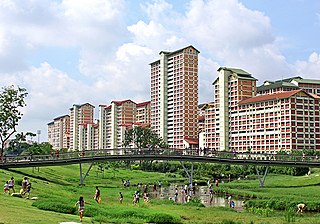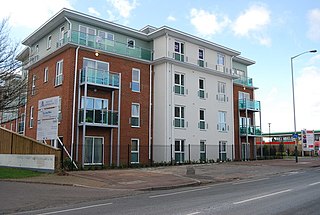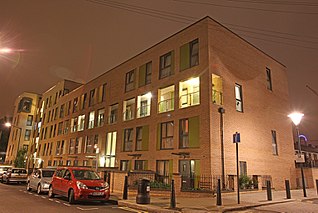Related Research Articles

Public housing is a form of housing tenure in which the property is usually owned by a government authority, either central or local.

In Ireland and the United Kingdom, housing associations are private, non-profit making organisations that provide low-cost "social housing" for people in need of a home. Any budget surplus is used to maintain existing housing and to help finance new homes and it cannot be used for personal benefit of directors or shareholders. Although independent, they are regulated by the state and commonly receive public funding. They are now the United Kingdom's major providers of new housing for rent, while many also run shared ownership schemes to help those who cannot afford to buy a home outright.

Chiltern District was one of four local government districts of Buckinghamshire in south central England from 1974 to 2020. It was named after the Chiltern Hills on which the region sits.

A landlord is the owner of a house, apartment, condominium, land, or real estate which is rented or leased to an individual or business, who is called a tenant. When a juristic person is in this position, the term landlord is used. Other terms include lessor and owner. The term landlady may be used for the female owners. The manager of a pub in the United Kingdom, strictly speaking a licensed victualler, is referred to as the landlord/landlady.
The Right to Buy scheme is a policy in the United Kingdom which gives secure tenants of councils and some housing associations the legal right to buy, at a large discount, the council house they are living in. There is also a Right to Acquire for assured tenants of housing association dwellings built with public subsidy after 1997, at a smaller discount. By 1997 over 1,700,000 dwellings in the UK had been sold under the scheme since its introduction in 1980, with the scheme being cited as one of the major factors in the drastic reduction in the amount of social housing in the UK, which has fallen from nearly 6.5 million units in 1979 to roughly 2 million units in 2017, while also being credited as the main driver of the 15% rise in home ownership, which rose from 55% of householders in 1979 to a peak of 71% in 2003.
Housing Benefit is a means tested social security benefit in the United Kingdom that is intended to help meet housing costs for rented accommodation. It is the second biggest item in the Department for Work and Pensions' budget after the state pension, totalling £23.8 billion in 2013–14.
In the United Kingdom, an arms-length management organisation (ALMO) is a not-for-profit company that provides housing services on behalf of a local authority. Usually an ALMO is set up by the authority to manage and improve all or part of its housing stock. Ownership of the housing stock itself normally stays with the local authority. As of July 2008, seventy ALMOs were managing over half of all UK council housing, consisting of more than a million properties. This number has since reduced as local authorities have taken services back in-house or stock has been transferred, of 2016 there are 37 ALMOs who manage nearly a third of local authority housing, approximately half a million council and ALMO homes.

Poplar HARCA is a housing association in the East End of London, England. It is the landlord of about 9,000 homes in the East London area, a quarter of which have been sold leasehold; the remainder are let on assured tenancies at subsidised rent levels.
Glasgow Housing Association (GHA) is the largest social landlord in Scotland with 40,000 homes across Glasgow. GHA is a not-for-profit company created in 2003 by the then Scottish Executive for the purpose of owning and managing Glasgow's social housing stock.
The Decent Homes Standard is a technical standard for public housing introduced by the United Kingdom government. It underpinned the Decent Homes Programme brought in by the Blair ministry which aimed to provide a minimum standard of housing conditions for all those who are housed in the public sector - i.e. council housing and housing associations.

Public housing in Australia is provided by departments of state governments. Australian public housing operates within the framework of the Commonwealth-State Housing Agreement, by which funding for public housing is provided by both federal and state governments. According to the 2006 census, Australia's public housing stock consisted of some 304,000 dwellings out of a total housing stock of more than 7.1 million dwellings, or 4.2% of all housing stock.
The Northern Ireland Housing Executive is the public housing authority for Northern Ireland. It is Northern Ireland's largest social housing landlord, and the enforcing authority for those parts of housing orders that involve houses with multiple occupants, houses that are unfit, and housing conditions. The NIHA employed 2,865 persons as of 31 March, 2020.

Coventry Cross Estate is a social housing estate in the Bromley by Bow district of the East End of London.
The Housing Act 1988 is an Act of Parliament in the United Kingdom. It governs the law between landlords and tenants. The Act introduced the concepts of assured tenancy and assured shorthold tenancy. It also facilitated the transfer of council housing to not-for-profit housing associations, which was then carried out partly through the system of Large Scale Voluntary Transfer.

Public housing provided the majority of rented accommodation in the United Kingdom until 2011 when the number of households in private rental housing surpassed the number in social housing. Houses and flats built for public or social housing use are built by or for local authorities and known as council houses, though since the 1980s the role of non-profit housing associations became more important and subsequently the term "social housing" became more widely used, as technically council housing only refers to housing owned by a local authority, though the terms are largely used interchangeably. Before 1865, housing for the poor was provided solely by the private sector. Council houses were built on council estates, where other amenities, like schools and shops, were often also provided. From the 1950s, blocks of flats and three-or-four-storey blocks of maisonettes were widely built, alongside large developments of terraced housing, while the 1960s and the 1970s saw construction of many high-rise tower blocks. Flats and houses were also built in mixed estates.

A council house is a form of British public housing built by local authorities. A council estate is a building complex containing a number of council houses and other amenities like schools and shops. Construction took place mainly from 1919 after the Housing Act 1919 to the 1980s, with much less council housing built since then. There were local design variations, but they all adhered to local authority building standards. The Housing Acts of 1985 and 1988 facilitated the transfer of council housing to not-for-profit housing associations with access to private finance, and these new housing associations became the providers of most new public-sector housing. By 2003, 36.5% of the social rented housing stock was held by housing associations.
The Housing Act 1985 is a British Act of Parliament. The act introduced laws relating to the succession of Council Houses. It also facilitated the transfer of council housing to not-for-profit housing associations.

The Housing and Planning Act 2016 is Act of Parliament in the United Kingdom that makes widespread changes to housing policy and the planning system. It introduces legislation to allow the sale of higher value local authority homes, introduce starter homes and "Pay to Stay" and other measures intended to promote home ownership and boost levels of housebuilding. The Act has been subject to a number of criticisms by those opposed to the loss of social housing promoted, the extension of right-to-buy to housing associations and possible work disincentives under "Pay to Stay".
A Large Scale Voluntary Transfer (LSVT) is a term used in the United Kingdom to refer to the transfer of council housing to a housing association. For a Large Scale Voluntary Transfer to occur residents must be balloted. Supporters argue that transfer allows for greater investment to build more housing but critics argue that voluntary transfer amounts to back-door privatisation.
Clarion Housing Group is the largest housing association in the United Kingdom with 125,000 properties across more than 170 local authorities. https://www.myclarionhousing.com/about-us Clarion Provides a home to over 350,000 people. https://www.myclarionhousing.com/about-us
References
- ↑ Morris, Charlotte. "Transferring housing stock from council ownership to housing associations, a continuing success". Joseph Rowntree Foundation. Joseph Rowntree Foundation. Retrieved 18 August 2015.
- 1 2 3 Pawson, Hal. "Reviewing Stock Transfer" (PDF). University of Toronto. Archived (PDF) from the original on 17 November 2015. Retrieved 17 September 2015.
- ↑ Pawson, Hal; Mullins, David (2010). After Council Housing: Britain's New Social Landlords. Basingstoke: Palgrave MacMillan. ISBN 978-1-4039-3514-4.
- ↑ "Transfers – Large Scale Voluntary Transfers (LSVT)". The Hidden History of Tenants. Leeds Tenants Federation. Archived from the original on 4 March 2016. Retrieved 17 September 2015.
- ↑ Hetherington, Peter (2008-12-10). "Voluntary transfer for social housing celebrates 10 years". Guardian. Archived from the original on 2016-03-05. Retrieved 17 September 2015.
- ↑ "Stock Options". Decent Homes Standard. Archived from the original on 2008-06-24. Retrieved 2015-09-17.
- ↑ "Social Housing - Ministry of Social Development". Archived from the original on 2017-01-28. Retrieved 2017-01-26.
- ↑ Johnson, Alan. "The New Politics of Social Housing" (PDF). Archived (PDF) from the original on 2016-04-04. Retrieved 2016-05-06.
- ↑ Alan Johnson, The New Politics of Social Housing. March 2014. http://www.salvationarmy.org.nz/sites/default/files/uploads/20140723SPPUAlanJohnsonspeechMar14.pdf Archived 2016-04-04 at the Wayback Machine